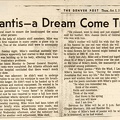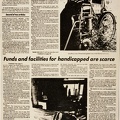The Sunday Denver Post - August 29, 1976
[This article in continued in ADAPT 37, but the entire text is included here for easier reading]
[Headline] Denver and the West
Denver Post Photos by Ernie Leyba, Photo 1 (top left): Two hands gently hold a key.
Photo 2 (on right): A young woman (Jeannie Joyce) in a manual wheelchair sits next to a floor lamp, and beside her kneels an older woman (Mary Joyce). Jeannie is looking up and her mother is looking forward to the right. Both are absolutely beaming.
Captions (in middle) read: A key, left to a new apartment is a thing of joy to Jeannie Joyce, in wheel chair being hugged, at right, by her mother, Mrs. Mary Joyce, after Miss Joyce moved into her new apartment.
[Subheading] Apartment Key Fulfills Dream for Five Atlantis Residents
by Fred Gillies
“My key!" Jeannie Joyce cried out exultantly, cupping a door key almost prayerfully in her hands and moving in her wheelchair room to room in the small apartment in south Denver.
Jeannie's eyes sparkled and at times misted as she turned the wheelchair in one direction and then another.
"It‘s my house," murmured Jeannie, 25, who has been confined to a wheelchair most of her life by a form of muscular dystrophy.
Jeannie and four other residents of the Atlantis Community for the handicapped in Denver are taking a major step. They are moving from Atlantis into their own apartments as part of a pilot project that may become a model for the state.
The move is supported by state officials who see it as an exciting extension of the Atlantis goal - making disabled persons more independent and providing a stimulating atmosphere in which they can realize their full potential.
To Jeannie and the four other Atlantis residents, this move to their own apartment is “a dream come true."
Jeannie shouted with joy last week when she saw her apartment - the first she has ever had.
"I love it!" she said "it fits me because it's a little place and I'm a little person."
But the road to this apartment was a long one.
After living at home for her first 21 years, Jeannie entered a nursing home where she remained for more than three years.
At the nursing home there was no particular program for Jeannie. Her only work was at a sheltered workshop where she counted fishhooks and placed them in packages and performed other simple and undemanding tasks.
Slightly more than a year ago, Jeannie was among eight disabled persons who moved from Denver area nursing homes and became charter residents at the Atlantis Community, 2965 W. 11th Ave.
At Atlantis, Jeannie began working as an operator on the telephone hot line which helps Atlantis residents and other disabled persons in metropolitan Denver find the services they need. In time, Jeannie was named supervisor of the hotline.
Newly established in her own apartment, Jeannie will continue to work on the hot line at Atlantis. This is the way she always wanted it - her own home, a meaningful job and a wide-open future.
But Atlantis officials have stressed that it wouldn't have been possible for Jeannie and the other four Atlantis residents to go out on their own without state support for a proposal advanced by Atlantis.
That proposal was presented in June to Henry A. Foley, director of the Colorado Social Services Department.
Foley's response was enthusiastic according to Wade Blank and Glen Kopp, codirectors at Atlantis. And as a result, Foley set up a pilot project which will go until the end of 1977.
Simply stated, the project involves Atlantis' creation of an expanded staff of attendants to provide necessary services to the disabled in their apartments and homes as well as at Atlantis.
And the state Medicaid fund will pick up the difference between government cost for attendant services and the amount of funds that actually are expended to provide the disabled with necessary care as certified by a physician.
Blank explained that the government pays an average of $575 monthly for a severely disabled young adult living in a nursing home.
If the disabled person moves into his own apartment he receives $186?[text is blurry] monthly from various governmental sources to pay for his rent, food, telephone and personal needs. And a county social services department may provide an additional $40 to $217 monthly to the disabled person for attendant services.
But quite often, Blank said, even the maximum of $217 monthly doesn't cover the attendant services needed. And qualified attendants may not always be available, he noted.
The cooperative program between Atlantis and the state might remedy those shortcomings and might cut government expenditures for the disabled substantially, Blank said.
If the program is successful, Blank said, it could be expanded statewide for the disabled. Eventually, he added, the program might be extended to the state's elderly persons to keep them in their own homes and
apartments, rather than placing them in a facility outside the home.
Equally elated over the program is Mary Joyce, who is Jeannie's mother.
Mrs. Joyce and her husband, Joseph, came to Denver last week from their home in Scarborough, Maine and were with Jeannie when she first viewed her apartment.
“It's a pretty wonderful step" Mrs. Joyce said as she watched her daughter move in her wheelchair through the apartment.
"We can't believe the strides she's made in the last two years with her determination to live on her own and take care of herself."
To two other Atlantis residents, George Roberts and Don Clubb, the move to their own apartment is "a pretty big change."
Born with cerebral palsy, George, now 28, was left as an infant at the door of an adoption agency in southern Colorado.
George then was placed in a state home and training school where he remained for 21 years - a period he describes as "all my life." He also spent more than four years in a nursing home before being accepted at Atlantis in June 1975.
Don, who soon will be 20, lost both legs as the result of a slide down a mountainside when he was six years old.
For about 10 years, Don was in state home and training schools. And for the past five years, he has been in a nursing home. He, too, is confined to a wheelchair.
Last week, as George and Don viewed the apartment they will share in north Denver, they seemed to invest the nearly empty rooms with an almost magical air.
"It's wonderful," George said over and over. Carefully, he moved his wheelchair up to the electric stove and inspected the oven. In the bedroom, he was jubilant as he examined the heating and air-conditioning controls. And almost reverently, he opened and closed the sliding doors of a large bedroom closed.
Don spoke quietly but with no less enthusiasm. "It's a very nice place - the first place of my own," he said. He smiled in the direction of the outdoor pool and said he swam very well and would teach George.
Also preparing to move into an apartment they will share in south Denver are two other Atlantis residents, Carolyn Finnell, 33 and Nancy Anderson, 31.
When she was 21, Nancy underwent surgery for removal of a brain tumor. For the next nine years, Nancy just sat in Denver area nursing homes unable to talk or walk, her body partially paralyzed.
At that time, doctors said Nancy would be confined to nursing homes for the rest of her life and would never walk again.
But since moving to Atlantis last summer, Nancy has been striving diligently in therapy sessions at Denver General Hospital. Working through the pain and the fatigue, she has learned to walk for up to 300 yards with the aid of a walker. And she has expanded her vocabulary to almost 10 words and is using a word machine in the new process of learning others.
For Carolyn Finnell, who was born with cerebral palsy, there has been no easy or direct road to independent living.
After finishing the ninth grade, Carolyn wasn't particularly encouraged to continue.
But she was convinced and convinced others, that she was capable of further education. She obtained her GED, or general equivalency diploma, which is equivalent to a high school diploma. And she earned a degree in journalism at Metropolitan State College.
But then there were the leaden days - four years in nursing homes "which didn't work out."
Afterward, Carolyn came to Atlantis and her hope was reborn.
Now, Carolyn is working in the Atlantis planning office and preparing plans for the education of the disabled.
In her quarters at Atlantis last week, Carolyn said it was painful to leave so many behind when she left the nursing home.
"But as we move out of Atlantis, it will make it possible for others to move in - and they never thought that was possible," she added.
Looking to the future, Carolyn said she would like to return to school to obtain training so that she can tutor disabled persons who have never had an education.
"There's a whole generation of disabled people who have been denied an education," she said.
Carolyn stressed that she wasn't going to "wage a war against nursing homes I'm willing to live and let live."
But she obviously was emotionally affected as she said, "I never realized until I got out of a nursing home that for a young person, it's a living death: You really have nothing to live for...nothing to do but just sit.
Many disabled persons, Carolyn noted, attend Opportunity School and Boettcher School in Denver.
"But I know for myself," she said, "I didn't have any faith in my ability to work."
"But I've been involved in Atlantis planning," she said as a smile swept across her face and she threw out her arms, embracing the air. "I've gained faith in my ability and I'm started to get ambitious."
Her next words came slowly, with triumphal emphasis: "I....just....feel....alive!"
PHOTO: A woman (Carolyn Finnell) sits in her wheelchair. She is turned sideways, relaxed, facing the camera. Her arm is slung over the backrest, and she is beaming.
- Created on
- Wednesday 10 July 2013
- Posted on
- Friday 12 February 2016
- Tags
- apartments, Atlantis Community, attendants, Cape Cod, Carolyn Finell, Colorado Social Services, Don Clubb, education, GED, George Roberts, Glenn Kopp, home, hot line, independence, independent living, institutions, Jeannie Joyce, key, Medicaid, Nancy Anderson, nursing home, sheltered workshop, State Home and Training School, Wade Blank, work
- Albums
- Visits
- 6886
- Rating score
- no rate
- Rate this photo


0 comments